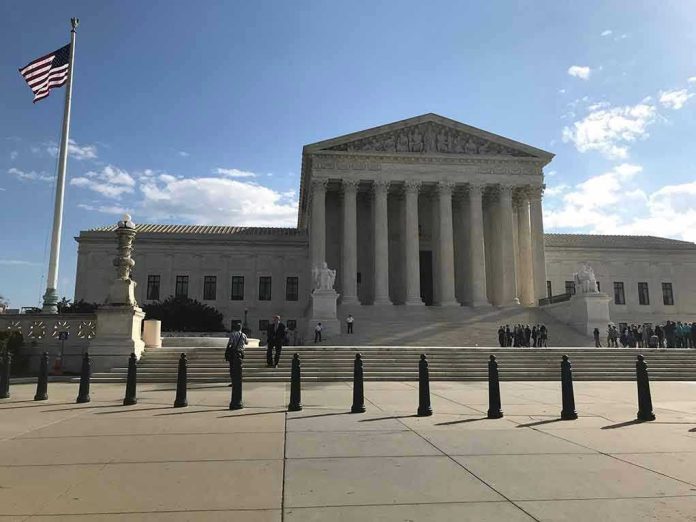
The Supreme Court’s recent decision to uphold Tennessee’s ban on gender-affirming care for minors has ignited a firestorm, but here’s the kicker: most Americans actually approve of these rulings—even as progressive activists and media elites ramp up the outrage machine.
At a Glance
- The Supreme Court upheld Tennessee’s ban on gender-affirming medical treatments for minors, affecting 25 states immediately.
- Rulings also strengthen parental rights to opt out of LGBTQ content in schools and support stricter age verification for adult websites.
- Despite massive media backlash, recent polling shows a majority of Americans back these Supreme Court decisions.
- Advocacy groups and dissenting justices claim harm to transgender youth, but the Court emphasizes states’ rights and constitutional boundaries.
Supreme Court Hands Down a Decision the Media Can’t Spin Away
The Supreme Court’s June 18, 2025 ruling in United States v. Skrmetti sent shockwaves through the left-wing commentariat, but the facts are stubborn things. With a 6-3 majority, the high court allowed Tennessee—and by extension, 25 other states—to enforce bans on puberty blockers, hormone therapy, and gender-transition surgeries for minors. The majority, led by Chief Justice Roberts, reminded the nation that the Court’s job is to interpret the Constitution, not to bend to whatever social agenda is trending on cable news or in faculty lounges. Roberts’ opinion made clear: “Courts are not super-legislatures.” The decision follows a years-long surge in state laws restricting controversial treatments for children, as parents and lawmakers grew increasingly frustrated with activist-driven medicine and schools shutting them out of their own kids’ lives.
While the usual suspects—ACLU lawyers, leftist medical associations, and activist politicians—howled that the ruling would bring “untold harm” to transgender youth, polling tells a different story. Most Americans side with the Court, supporting both the medical safeguards for minors and the right of parents to control what their children are exposed to in schools and libraries. The public, apparently, hasn’t bought into the fantasy that children should be making irrevocable life-altering decisions before they’re old enough to drive or vote.
Parental Rights and Common Sense Win the Day
The left’s meltdown over the Skrmetti decision isn’t just about gender medicine. It’s a proxy for a much bigger fight: who gets to raise America’s children—parents, or bureaucrats and activists? Along with the headline ruling on gender-affirming care, the Supreme Court’s recent term featured decisions upholding parental opt-out rights for LGBTQ story time and sex-ed content in public schools. For years, parents have watched as their concerns were dismissed as “bigotry” by school boards and library officials pushing radical curricula behind closed doors. Now, with the Supreme Court affirming that parents—not bureaucrats—hold the final say, the pendulum is swinging back to sanity.
This judicial restraint signals a refreshing return to constitutional order. The days of unelected judges inventing new rights out of thin air appear to be waning. Instead, the Court is telling states and local communities, “If you want to make these decisions, do it through your legislatures—don’t expect us to rubber-stamp your social experiments.” For those of us who still believe in federalism, the rule of law, and the basic idea that parents know better than bureaucrats, this is long overdue.
The Usual Outrage Machine and Its Predictable Meltdown
The reaction from progressive advocacy groups and Democratic appointees on the Court was as predictable as it was overblown. Justice Sotomayor’s dissent painted a dire picture of “untold harm to transgender children and the parents and families who love them.” The ACLU, never one to miss a fundraising opportunity, blasted the ruling as an attack on civil rights and promised more lawsuits and protests. Mainstream media outlets dutifully amplified these talking points, warning of a return to the dark ages. But in reality, the ruling simply allows states to pause and examine the evidence before exposing children to irreversible medical procedures—a position that, according to recent polling, is shared by most Americans.
Let’s be honest: we’re living through a period of manufactured crises, from “book bans” that are really just age-appropriate review, to “attacks on healthcare” that amount to protecting children from unproven interventions. The Skrmetti decision, and the public’s support for it, signals that voters are waking up to the absurdities of the left’s ever-expanding wish list. When even the Supreme Court says “enough is enough,” maybe it’s time for activists to stop lecturing the country and start listening to the people who actually pay the bills and raise the kids.
Where the Fight Goes from Here
In the short term, the Supreme Court’s ruling means immediate enforcement of gender-affirming care bans in 25 states, with similar legislation likely spreading. Parents gain expanded rights to opt out of controversial content in public education, and age verification laws for adult websites are getting teeth. Medical providers and activist groups promise continued legal challenges, but their path is now steeper—and public support for their cause appears to be waning.
Long-term, this string of Supreme Court decisions could mark a turning point in the culture wars. States will decide for themselves how to handle these divisive issues, while parents reclaim their rightful role as guardians of childhood. The days of top-down, one-size-fits-all social engineering may be coming to an end—and not a moment too soon for those who value liberty, common sense, and the Constitution.




